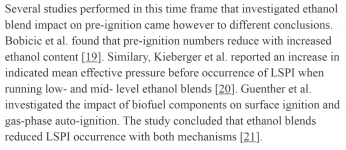I know an individual who possesses a profound fascination with engines. He immerses himself in their intricacies, meticulously disassembling them and engrossing himself in the accompanying documentation. Recently, he developed an interest in the history of LSPI and how it made an unexpected entrance in 2010. To his surprise, he even discovered the names of two key figures (Terrence & Chris, SwRI) behind this phenomenon, with Terrence Alger emerging as the primary evangelist. SwRI, a reputable company, played a pivotal role in LSPI inception. You can easily find more details with a quick online search.
Curiously, my acquaintance remains skeptical about the possibility of LSPI. He firmly believes that modern engine control units (ECUs), equipped with ion and knock sensors, can swiftly detect such issues. Consequently, the ECUs promptly cut off fuel supply to prevent any damage, triggering an emergency mode. This perspective holds some truth. Advocates of LSPI argue that the ECU supposedly requires prolonged detonation to consider the signal stable enough for a response. It's difficult to ascertain the absolute truth of this matter.
It's worth noting that the ignition-inducing properties of certain metal compounds present in oils have been recognized for quite some time. Studies (
https://saemobilus.sae.org/content/720153 ) as early as 1972 or 1973 explore the effect of these compounds on sudden ignition. However, since then, computer control systems for internal combustion engines have undergone significant changes, incorporating features like ionic and detonation sensors, among others. This progress leads us to question whether the LSPI issue has been exaggerated.
Moreover, it's important to acknowledge that not all engines are susceptible to LSPI. In fact, some oil manufacturers confidently claim that their products are entirely immune to such occurrences. Despite this, isolated incidents persist, such as the well-documented problem with Mercedes pistons and, of course, Ford - with any oils.


